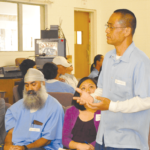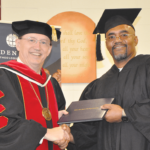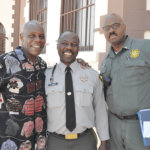Congresswoman Jackie Speier ventured inside San Quentin State Prison to hear firsthand about incarceration, rehabilitation and reentry from 26 inmates … [Read more...]
Archives for August 2015
Exploring Injustices In Mass Incarceration
More than 200 people from across America met inside San Quentin State Prison for a (Restoring Our Original True Selves) ROOTS symposium exploring the … [Read more...]
15 Men Cited for Ministry Skills At 4th Annual Theological Graduation
It took more than two and a half years for 15 San Quentin Prison men in blue to finish a religiously based college course that they say not only … [Read more...]
Lethal Weapon Star Hits the Yard
You weren’t seeing things. That really was the actor from the “Lethal Weapon” movies crossing the yard at San Quentin. Veteran actor Danny Glover was … [Read more...]
Catholic Choir Director Departs for New Position
Sister Karen Conover will be winding up 15 years as director of San Quentin’s Catholic Chapel choir for a new ministry. She will be departing in … [Read more...]
Senators Introduce Bill Boost Second Chances
Federal legislation has been introduced aimed to help people with criminal records get a second chance at a successful life. The bill would accomplish … [Read more...]
‘New, Bigger Thinkers’ Said to Be Brown’s Court Picks
The changing face of the California Supreme Court was discussed by its chief justice in an interview with KQED. Chief Justice Tani Cantil-Sakauye … [Read more...]
Overheated Prisons Prompting Lawsuits
There is growing concern about overheated prisons endangering the health and lives of inmates and guards. Several lawsuits detail the need for … [Read more...]
Forced GPS Placement Ruled a ‘Search’
The U.S. Supreme Court has ruled that law enforcement placing a GPS tracking device on a person amounts to a search, and is therefore protected by the … [Read more...]
Ward Allen Focuses on Jobs for Ex-Inmates
For 17 years, Ward Allen has been helping transform the lives of former male and female prisoners, helping them get job skills and jobs. “The slight, … [Read more...]
- 1
- 2
- 3
- …
- 5
- Next Page »






